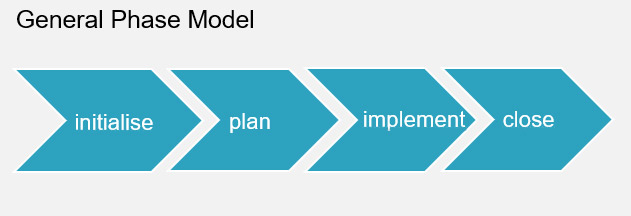Project Management Phases
Begin a conversation

Project management phases at a glance
For managing directors and project managers
Boxheimer Projects acts as external partner who is in constant contact with you and provides support for the realisation of your upcoming projects.
Do the right things – doing things right.

Step by step to an optimal implementation
Implementing effective project management is as simple as switching to projects themselves. In many companies, this process has been ongoing gradually over the last few years and allows for a smart structuring and implementation of work processes that are part of the respective project. This structured approach can be continued in the same way with the five phases in project management.
Smart project management evolves in an iterative way during the course of implementation. Since a variety of digital and technical tools are available, the first step is to find out which tools are most likely to serve your own project management. Once established and adapted to your company's problems, any future project can be handled faster, easier and more cost-consciously.
The following overview of five typical phases in project management is universally applicable and is implemented by us as a professional service provider in project and process management. The concrete design of individual phases depends on the character of the project, your industry and other factors.
The 5 project management phases at a glance
1. preparation of the project
In the first project phase of modern project management, it is clarified whether and in which form the implementation of a project is possible and makes economic sense. Usually there are more ideas and proposals for projects than there are working hours and financial resources available to work on them. Therefore, a business case is prepared and used as a basis for project selection. In this process, all information is collected, from the main content of the project to the desired results. This information is summarised in a project proposal, which can be approved by the management.
2. initiation of the project
In the second phase, the composition of a suitable project team is also continued. Further bodies can be set up to supervise the team, such as a steering group or a board for quality assurance. At the end of the second phase, all framework conditions are clarified so that the detailed planning of the project can begin.
3. planning the project
4. implementation of the project
Practice shows that the implementation of the project rarely goes according to plan. The project manager therefore regularly compares the target and actual status of the project and intervenes in a controlling manner. This often makes it necessary to adjust the plan with effects on future processes, personnel and the costs of the project.
5 Closure of the project
A review of the project is useful, whereby feedback should be obtained from all those involved in the project. The lessons learned can be summarised in a final report and taken into account in further projects. Finally, the project manager and the team are discharged and the project is officially closed by the project client.
Boxheimer Projects for smart project management
Approaching project management in your company using the five phases as described is an established approach worldwide. However, not every project has to follow the five phases strictly. Especially if you have experience in implementing projects and are planning similar projects in the future, it is possible to build on existing knowledge and plans.
If you are entering modern project management for the first time or if there is a lack of specialised personnel internally for the implementation of projects, Boxheimer Projects is the partner of choice for you. We will gladly take over the entire project management for you and familiarise you and your staff with the different phases useful approaches of project management.
If you have further questions about the five project management phases or if you are interested in a cooperation, Boxheimer Projects is looking forward to hearing from you!

Begin a conversation:
For more information, simply click on the button!